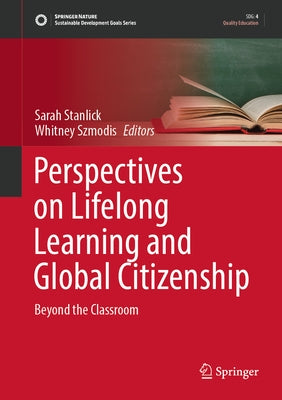Before you leave...
Take 20% off your first order
20% off
Enter the code below at checkout to get 20% off your first order
Discover summer reading lists for all ages & interests!
Find Your Next Read

This book lays the groundwork for the future of global citizenship, and it discusses where we are now, where to go from here, and how all of this fits into a lifelong learning context. It incorporates case studies, meta-narratives, and empirical studies to support cosmopolitanism through a lifelong learning lens and is a must read for educators, activists, non-governmental organizations, civil society, and community organizations.
The framing for this book is with the United Nations Sustainable Development Goal 4 in mind: ensuring inclusive and equitable quality education and promoting lifelong learning opportunities for all, with the intent that all learners will acquire the knowledge, skills, and attitudes necessary to promote "sustainable lifestyles, human rights, gender equality, promotion of a culture of peace and non-violence, global citizenship and appreciation of cultural diversity and of culture's contribution to sustainable development" (UN Sustainable Development Goal, target 4.7). It is through this lens that this book showcases the work of researchers, practitioners, civil society, and thought leaders in global citizenship for lifelong learning. While this tension between nationalism and cosmopolitanism exists, the wheels of globalization still turn and shape our local, national, and global connections. Through this exploration, this book lifts up examples of global citizenship education done well, across the age spectrum, and in a variety of contexts. The binding factor is the core values, ethics, and moral structure of a world in collaboration toward its larger human and ecological thriving. It unpacks complex topics such as ethical and cultural relativism, accountability and responsibility in a global world, decolonial education and unmaking ideas of "development", and ethical models for community-based global learning and engagement. What voices are missing in the discussion of global learning and global citizenship education?Whitney Szmodis is a community-based and global educator and researcher working in community health promotion at St Luke's University Health Network in Bethlehem, Pennsylvania, USA. Previously, she was director of the Lehigh University-United Nations Youth Representative Program and Director of Global Citizenship at Lehigh University. Whitney maintains partnerships with United Nations-affiliated NGOs on five continents, and researches on issues related to environmental sustainability, gender equality, health, social justice, and youth empowerment using a global citizenship lens. Her research interests focus on social cognition in both local and global contexts, as well as education and health promotion as a catalyst for individual and community thriving and resilience.
Sarah Stanlick, Ph.D., is a faculty member in the Department of Integrative and Global Studies at Worcester Polytechnic Institute and the director of the first-year, SDG-focused GreatProblems Seminar. She was the founding director of Lehigh University's Center for Community Engagement and faculty member in Sociology and Anthropology. She previously taught at Centenary College of New Jersey and was a researcher at Harvard's Kennedy School, assisting the former US Ambassador to the United Nations, Samantha Power. Her research interests include global citizenship, health and human rights, transformative learning, and technology's impact on empowerment and capacity to build community.
Thanks for subscribing!
This email has been registered!
Take 20% off your first order
Enter the code below at checkout to get 20% off your first order